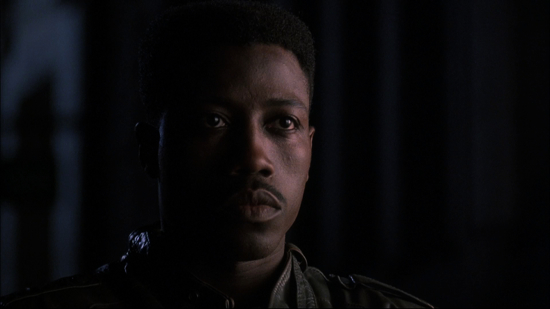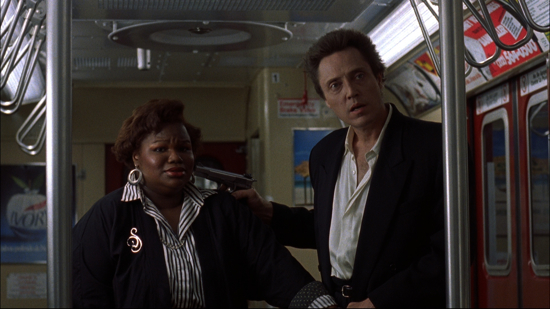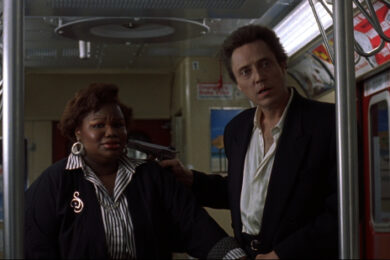In life there are certain things that start out as simple opinion but eventually become immutable fact. Not in the modern t’interweb ‘my opinion = fact’ sense, but in the etched-in-DNA, sun rises and sets every day kind of way.
One of these facts is that Christopher Walken is cool. Earlier in his career this wasn’t as widely acknowledged as it is today, but his performance in Michael Cimino’s The Deer Hunter (1978), as a traumatised and self-destructive victim of the Vietnam experience, at the very least laid early foundations for the almost universal acceptance of Walken as one of the most unique and hypnotic cinematic presences of the past forty years. In between action-adventures and dramas, Walken would further punctuate his career with David Cronenberg’s The Dead Zone (1983), playing a haunted and doomed psychic, and one of his most wildly entertaining roles as villain Max Zorin in the sadly subpar Bond movie A View To A Kill (1985). Despite being a regular screen presence throughout the ’80s, Walken’s star never truly ascended until the following decade’s Tarantino era.
Most of us today are invested in his unique brand of cool thanks to turns in True Romance (1993) as Vincenzo Coccotti (aka ‘The Sicilian’) and Pulp Fiction (1994) as Captain Koons, the war veteran returning a watch after years spent concealing it from North Vietnamese captors by keeping it hidden up his arse. (There was also, of course, his celebrated dance routine in Fatboy Slim’s ‘Weapon Of Choice’ video.) These were mainstream appearances that netted Walken numerous plaudits as a character actor, yet his cachet as a leading man was not so high, with the majority of his starring vehicles receiving only fleeting cinematic releases, if any at all.
Abel Ferrara’s 1990 thriller King Of New York, in which Walken plays enigmatic drug kingpin Frank White, was met with widespread derision by critics and performed poorly at the box office. As is often the case with unfairly vilified films, it was ‘rediscovered’ by millions thanks to the home video market, and critical opinion has steadily about-turned over the years. The initial, often hateful, response may have been in part due to the reputation of Ferrara himself, though today he’s fairly well respected as a gifted director of challenging, anti-mainstream fare such as Bad Lieutenant (1992), Dangerous Game (1993), The Addiction (1995) and The Funeral (1996).
For the past fifteen years, Ferrara’s work has continued to earn praise from critics while receiving less and less exposure. Ironically, King Of New York may well be his most mainstream offering – but at the time of its original release his main claims to fame were as the director and star of infamous shocker The Driller Killer (1979), director of grindhouse rape/revenge thriller Ms. 45 (1981) and, the year prior to King Of New York, as the man who drove then hot property Kelly McGillis to quit acting after directing her in the Elmore Leonard adaptation Cat Chaser. Little wonder that critics at the New York Film Festival premiere failed to note the movie’s qualities in favour of baulking at its bleak depiction of the city’s underbelly, at a time when the place was desperately trying to rehabilitate itself in the eyes of the world.
Walken, at his intense and enigmatic best, was born to play Frank White: a complex blend of cold killer, politician, criminal mastermind and philanthropist. After being released from prison he effortlessly navigates the New York landscape, whether at the top or the bottom of the social mountain, in a bid to establish himself as the city’s major player. He’s pitted against the old schools of organised criminals and, fatefully, a jaded police department prepared to use highly questionable methods themselves in their pursuit of White.

Although undoubtedly the star of the piece, Walken is supported by a raft of quality character actors, many either re-establishing themselves as high profile players (Larry Fishburne) or attempting to step up from TV success (David Caruso). The cast also includes Steve Buscemi and Wesley Snipes, the latter less than a year before his breakthrough role as Nino Brown in the decidedly inferior yet considerably more successful OG flick New Jack City. The crucial counterpoint to Frank White is provided by Ferrara favourite Victor Argo as the ashen, angina-stricken police captain Roy Bishop, who has to contend not only with White’s insouciance in the face of the law and apparent untouchability, but also with the youthful exuberance and petulance of his own men.
King Of New York is saturated with everything but the smells of New York circa 1990. The film wields a smart authenticity seldom seen in its ilk since the ’70s works of William Friedkin, Martin Scorsese and Sidney Lumet. The combination of Ferrara’s stark location shooting and screenwriter Nicholas St John’s tawdry picture of the crime world and its relationship with a city’s political movers and shakers forms a brilliantly cohesive narrative, encompassing themes that would be echoed and expanded upon more than a decade later in TV shows The Shield and The Wire.
Admittedly Pookie’s crack scene is a winner, but the fact that New Jack City overshadowed King Of New York is enough to make one’s shit itch. However, the years have been very kind to Abel Ferrara and Christopher Walken’s career-defining film. It is now widely acknowledged as one of the best hard-edged crime thrillers of the past thirty years, certainly since the golden age of the 1970s.
A Dual Format Edition of King Of New York is out today through Arrow Video.



